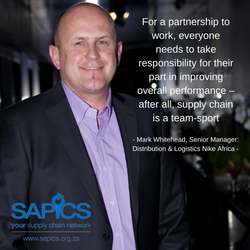 Why putting people first makes for winning partnerships When it comes to improving supply chain efficiency, a South African success story proves that focusing on relationships with people in developing healthy partnerships works better than simply spending more on processes and upgrading technology. An internationally recognised partnership between Nike Africa and Barloworld Logistics has succeeded in reducing logistic costs to net revenue by almost 40%, off-setting labour increases by a 9% annual productivity increase while sustaining double digit growth for Nike. At the same time, Nike has experienced a two thirds reduction in reverse logistics flow. The secret to their success will be shared by Mark Whitehead (Nike Africa, Senior Manager: Distribution & Logistics) and Andre Hough (Barloworld Logistics, General Manager Nike CSC) when they present their workshop entitled What it takes to keep on winning at the SAPICS 2015 conference, taking place from 31 May - 2 June at Sun City. “If you want to improve your logistics, don’t pay more; just work with your partners on getting the right commercial model in place,” says Whitehead, reflecting on the six-year partnership with Barloworld Logistics. “Like any relationship, it takes work – but it’s worth it!” Maturity in a long-term relationship One of the greatest keys to their success, according to Hough, is their vested approach in terms of how they partner. “A lot of the decisions we have made to date are made with no end in mind, despite the fact that we have a contract that comes up for review at fixed times. Truly well entrenched with each other, we make decisions jointly as though our partnership will never end,” he says. This kind of understanding requires a great level maturity in the relationship, according to Whitehead. “Not unlike a marriage, such a successful partnership requires compromise, transparency and that both parties give of their all without holding back,” he says. “And when things go wrong, don’t blame each other. Rather work together to fix things.” An outcomes-based approach Having the same goal in mind is another key fundamental. “We don’t focus on the ‘what’ or the ‘how’ but rather on what we want to achieve. We are then able to figure out more clearly what it’s going to take from each side to achieve our objective,” says Whitehead. Reward performance Understanding client needs remains critical to success, says Hough. But equally so, according to Whitehead, “If you want your logistics partner to innovate and perform, you must incentivise such performance. There needs to be something in it for both parties.” Importance of stakeholder buy-in Another crucial factor in the equation is obtaining the necessary buy-in from all stakeholders, not just top management. “In our case, even the staff in our warehouse operations now view themselves as working for Nike in a blended environment.” “For a partnership to work, everyone needs to take responsibility for their part in improving overall performance – after all, supply chain is a team-sport,” concludes Whitehead. Want to find out more? Catch Whitehead and Hough at SAPICS 2015. The presentation by Mark Whitehead and Andre Hough at SAPICS 2015 is entitled: What it takes to keep on winning / Working together to win the next race. For more information on the 37th Annual SAPICS Conference & Exhibition, being held at Sun City from 31 May – 2 June 2015, please visit http://conference.sapics.org/ ENDS _______________________________________________________________________________________________________ MEDIA CONTACT: Cathlen Fourie, 012 644 2833, [email protected], www.atthatpoint.co.za For more information on SAPICS please visit: Website: www.sapics.org.za Twitter: @SAPICS01 LinkedIn: SAPICS group Facebook: OperationsManagement Comments are closed.
|
Welcome to the SAPICS Newsroom. For media releases prior to August 2014, please click here.
Archives
January 2017
Categories
All
|

 RSS Feed
RSS Feed